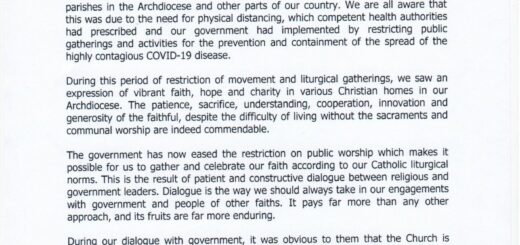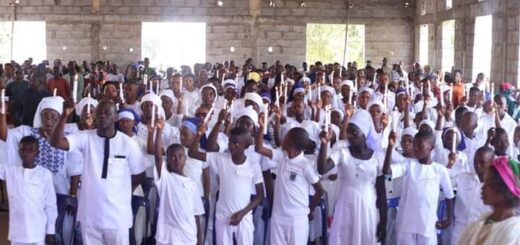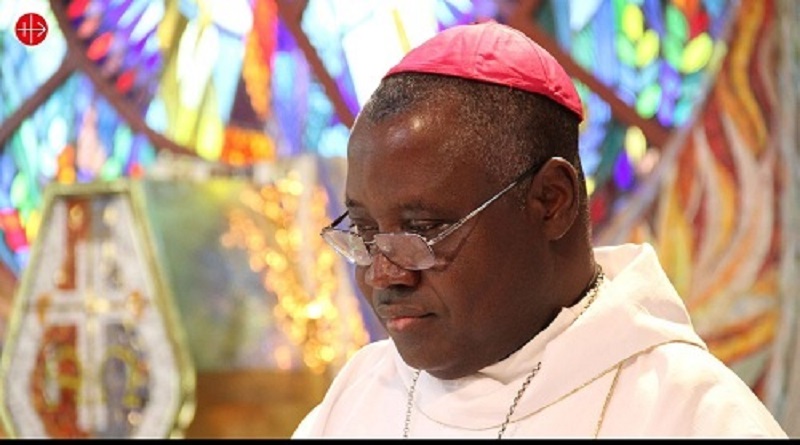EXCERPTS FROM THE OPENING ADDRESS AT THE STANDING COMMITTEE OF RECOWA-CERAO
by ARCH BISHOP · February 15, 2020
8TH ORDINARY SESSION,
Abidjan, February 12-17, 2020, by Most Rev. Ignatius A. Kaigama, RECOWA President
1. Greetings
Gathered for the 8th Ordinary Session of the Standing Committee of RECOWA-CERAO, we extend our warmest greetings and deep gratitude to our hosts especially, His Eminence, Jean- Pierre Cardinal Kutwã, Most Rev. Ignace Bessi, and Christ’s lay faithful. A special thank you to the Apostolic Nuncio, Paolo Borgia, who is participating for the first time in a meeting of our regional collegial body. Your Excellency, on behalf of the Cardinals, Archbishops and Bishops of West Africa, we say “Akwaba” to Abidjan and to West Africa.
We send our warm and respectful greetings to the Ivorian State, government, administrative and police authorities for their usual generous welcome and their collaboration while we are in Cote d’Ivoire.
2. Reflections
At this 8th meeting, we will first reflect on the theme: «Together, let us work for the rights of communities and the environment.”
The first decade of the 21st century was marked, among other things, by the increased interest of private investors and some states for land, especially agricultural land in general in the southern hemisphere of the planet, but especially in Africa. Indeed, it is estimated today that more than 60 % of the agricultural land available in the world is in Africa, south of the Sahara. Paradoxically, the massive grabbing of these lands, which results in the expropriation of the poorest populations, is done in the name of economic and social development. Unfortunately, once expropriated from their lands, the populations are deprived of the natural resources essential to their survival. Furthermore, the exploitation made of the immense areas of the grabbed land (often hundreds of thousands of hectares per operation) conforms in no way to the most pressing needs of the populations concerned: living in peace and in a healthy environment, while ensuring the most basic needs of life, including food sovereignty, which depends precisely on the agricultural activity and therefore on access to land, which should be a concern to us as pastors. We must think of all these lands and waters polluted by human activities. What happens to the riverine communities who can no longer cultivate the land, bathe and drink the water from the river? These communities that can no longer feed themselves? We are not against development. We simply hope that development does not come at the expense of the rights of populations and the environment.
To this problem, we must add those equally alarming issues like violence, kidnappings and killings in Burkina Faso, Mali, Niger, Nigeria, etc. Statistics on the kidnappings, deaths due to terrorist attacks in our West African region as supplied by ECOWARN, indicates that the incidents of kidnappings between January and December, 2019 were 242, armed attacks, 311 and 2,159 deaths. The number of kidnappings in Sahel-Sahara and Lake Chad due to terrorist attacks were 304 in Sahel Sahara with 1,820 deaths and in the Lake Chad 268 kidnappings and 1,637 deaths. These numbers are unfortunately frightening!
We don’t always like to see religious causes at the root of these problems. Underneath, there is the exploitation of religion for political and perhaps economic interests. We thank our governments for what they are already doing, but we are not congratulating them because they have not yet won the battle. The fight is tough and complex. That is why we urge and encourage them to unite to do better and more.
3. SOME AREAS FOR DISCUSSION
In the second part of our meeting we will study the reports of our different structures, the financial statements and the draft budgets. We will also have to decide on the project of a regional youth day for West Africa. The young people from certain national Conferences did an excellent job in presenting us with a proposal for the celebration of the Regional Youth Day.
We will also look into the Manual of financial, accounting and administrative procedures, the Code of conduct, the conditions of service and management principles proposed in February 2016, during the Standing Committee meeting in Abuja.
RECOWA-CERAO, after six years must think of acquiring land in Abuja and then the building of a secretariat worthy of her. We will reflect on the ways and means of achieving this.
At the third Plenary Assembly, the Bishops decided to hold their fourth Plenary Assembly in Nigeria. It will be in 2022. We must already think about the means for its organization. What must each Bishop or national conference do for the successful organization of this assembly?
4. Our Good Wishes and Conclusion
May this meeting help us to formulate or design robust and committed action plans in favour of the most vulnerable of our populations. This necessarily involves the assembling and pooling together of our resources and actions.
In this year 2020, six countries in West Africa will organize presidential elections: Burkina Faso, Côte d’Ivoire, Ghana, Guinea, Niger and Togo. We call on the political class, ruling parties, opposition and civil societies, but especially the ruling parties, to work together to develop electoral codes and fair and transparent structures in order to save our region from violence before, during and after elections. People have suffered much from elections won in advance.
May our reflections be enlightened by the Holy Spirit so that our work may breathe new life into our Churches and our Conferences, dispel internal contradictions, and make room for a credible and uncompromising evangelical witness.
Thank you for your kind attention.




